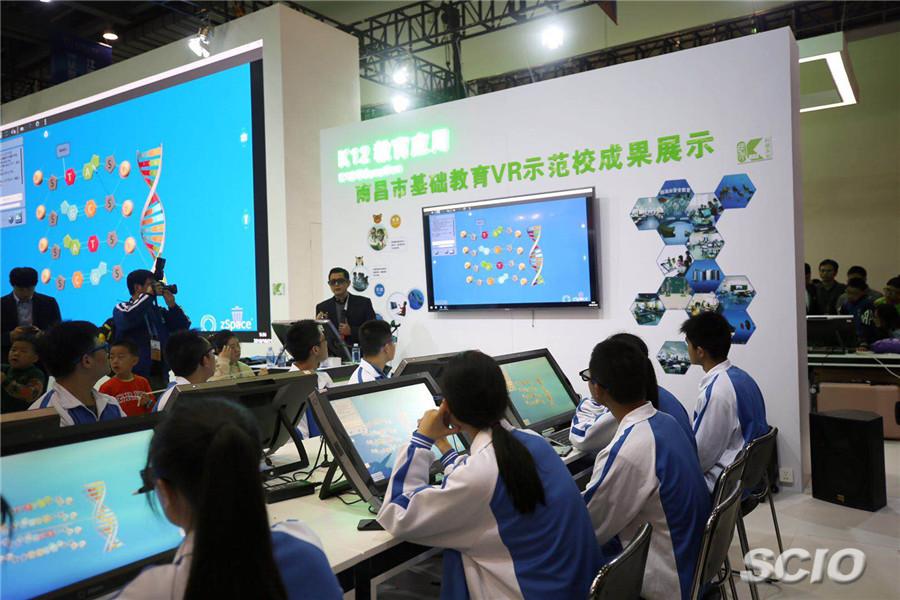Nanchang holds international conference on VR technology
The capital of Jiangxi province has been driving its economic growth through developing virtual reality technologies.
By Gao Zhan
Virtual technology becomes reality
In a biology class at a Nanchang Normal University-affiliated primary school, the students were sitting in front of VR desktop machines, wearing 3D glasses, using the VR stylus pen to flip the leaves for observing the caterpillars that were creeping on the back of the leaves. Currently Nanchang has three primary and secondary schools that have introduced VR technologies into the classroom.

Photo taken on Oct. 21, 2018 shows a teacher and his students wearing 3D glasses in a biology class. [Photo by Gao Zhan/China SCIO]
Jiangxi KMAX industrial Co., a local VR enterprise, is mainly engaged in the development and application of AR/VR and has a range of educational products. A person in charge of the company said that VR technology is now used in elementary, middle and high education. The VR desktop machines could help teachers to better explain difficult problems and help students to improve their interest in learning.
The technologies are also facilitating sales, with furniture and home accessories stores using VR headsets to help customers visualize new decorations in a virtual home.
In Nanchang, VR/AR technologies are not only used in education, gaming, shopping, tourism, they are also being integrated with traditional industries to promote intelligent upgrading of manufacturing.
Jiangling Motors has applied "AR+AI" technologies to automotive engine assembly. "If a worker wearing the AR glasses checks the supercharger, the camera will be aimed at the supercharger, and an operating procedure animation will be displayed to guide the workers," a staff member of the company said.
A world-class VR industry base built
In 2016, Nanchang started constructing China's first VR technology industry base and launched an industry plan.
In the past two years, Nanchang has built "four major centers:" the VR Innovation Center, the VR Experience Center, the VR Exhibition Center, and the VR Cloud Center.
Xiong Zongming is an overseas-educated Chinese who came back to the country to start a business, and he transferred his VR business from Shanghai to Nanchang a year ago. He received a three-year rent-free offer from the government for his business, as well as a startup fund of 2 million yuan.
Zhao Xu, general manager of Lenovo New Vision Intelligent Technology Co., said that in addition to the policy environment, the complete VR industry ecosystem of the base was attractive to the VR companies.
During the 2018 World Conference on VR Industry, cooperation agreements worth a total value of 63.15 billion yuan were signed, according to the Jiangxi provincial government.

